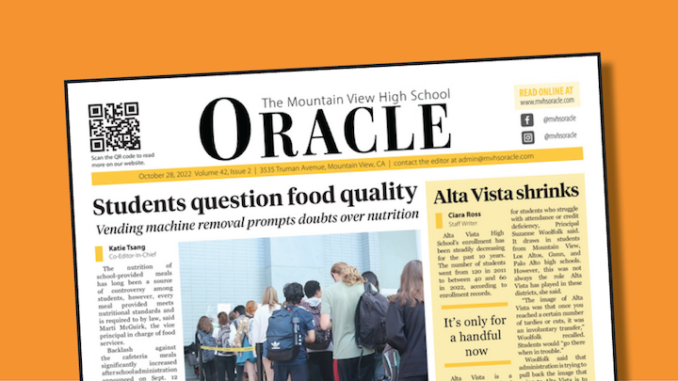
BY BRADEN CARTWRIGHT
Daily Post Staff Writer
The editor-in-chief and former faculty adviser of Mountain View High School’s student newspaper have filed a legal claim against Principal Kip Glazer, alleging that she violated their free speech rights by censoring an article about sexual harassment.
After the article was published, Glazer reassigned the adviser and canceled an Introduction to Journalism class.
Editor-in-chief Hanna Olson said in the claim that her job has been made “significantly more challenging” by Glazer’s actions.
New students joining The Oracle are no longer taught about the ethics of journalism, its technical aspects and its purpose, she said.
“Beyond losing out on valuable education, students in Olson’s class have expressed their distrust in the administration’s regard for the voices of their students,” attorney Jean-Paul Jassy of Los Angeles wrote in a Sept. 27 claim for Olson. Former adviser Carla Gomez is also a party in the claim. She was replaced with the high school’s drama teacher before this school year started.
Glazer told students that Gomez didn’t have the right teaching credential to be their adviser, but Jassy alleges that the rationale was “entirely pretextual and false.”
Gomez and Olson said they won’t file a lawsuit if the district meets these demands, including:
• Issue an apology signed by Glazer, Superintendent Nellie Meyer and Board President Phil Faillace acknowledging that Glazer censored the article, violating the constitutional rights of students.
• Reinstate the Intro to Journalism class this school year and make Gomez the adviser, with the same $7,000 bonus that she received before.
• Promise no school official will attempt to censor a future article by The Oracle.
Jassy gave the Mountain View-Los Altos High School District 10 days to respond.
“If all of the demands are not met by that time, my clients and potentially other MVHS students and their parents will very likely sue,” he said.
Gomez and Olson aren’t asking for any money at this point but could if there’s a lawsuit, said Jassy. He said he is working pro bono but would seek attorney fees too.
Glazer wouldn’t do an interview with the Post in the spring, and she didn’t respond to requests yesterday afternoon to talk about the claim.
The Oracle’s in-depth team published an article in their April print edition about several students who were subject to overly sexual comments and unsolicited nude photos from their peers.
Victims of sexual harassment told The Oracle that they felt like nobody cared about what happened to them.
Throughout the reporting process, Glazer stopped by the class and told Gomez that the article shouldn’t name any students.
“Glazer said words to the effect that students should write about MVHS in a ‘positive light.’” the claim says. “The implication the students drew was that The Oracle should avoid upsetting people.”
Students made some changes for journalistic reasons, but many more changes were made because they were “afraid of upsetting their principal,” the claim says.

Actually, the taxpayers own the newspaper. Look at CA Education Code 48907, the students get their say.
independent publications don’t “enjoy” a right to publish defamatory stories. That administrative oversight ability is listed in 48907, anything outside of those exceptions are allowed for the students.
[Portion removed — violation of Terms of Use]
the bigger point was that the principal was out of her depth by wanting publications that only made the school look good.
The students had worked with the student press law center. Truth is a defense against defamation. The principal’s stated objections were not because of defamation in any case.
Sad that these high school kids get stuck with a principal like this.
People sue over anything. If the coffee is too hot at McDonald’s they sue. You didn’t really answer the question, you just defaulted to the position that the principal should be the student paper’s editor.
Combining this with her cutting the school musical and trying to defund the performing arts programs? She deserves to be fired, straight up.
I hope the student and the former adviser win their lawsuit against the school district. The district clearly broke the law. The school board has been given a chance to resolve this case, and refused.
[Violation of Terms of Use — Commenter made an untrue statement. Stick to the facts please.]